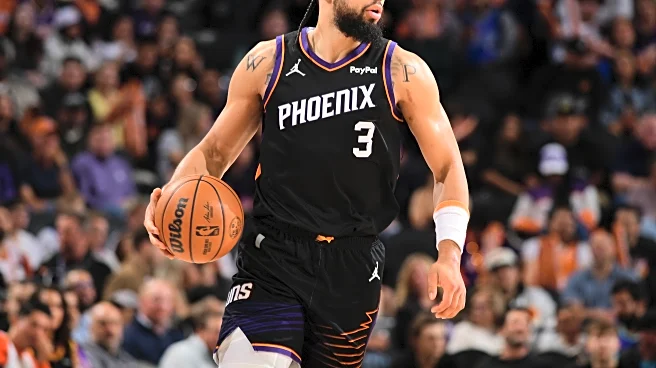What's Happening?
The Dallas Cowboys recently traded their All-Pro pass rusher, Micah Parsons, to the Green Bay Packers. This move comes after Parsons held out during the offseason and dealt with a back injury that affected his performance in training camp. The trade marks a significant shift for the Cowboys, who have struggled defensively, conceding 720 passing yards in their last two games. Meanwhile, the Packers have seen improvements in their defense, allowing only 20 points per game and achieving a passer rating of 63.0 when Parsons plays. The upcoming matchup between the Packers and Cowboys is highly anticipated, as Parsons will face his former team for the first time. The Cowboys will be without their key player, CeeDee Lamb, due to an ankle injury, which adds to the challenges they face against the Packers.
Why It's Important?
The trade of Micah Parsons to the Green Bay Packers is significant for both teams involved. For the Cowboys, losing a player of Parsons' caliber could further impact their defensive capabilities, which have already been under scrutiny. The Packers, on the other hand, stand to benefit from Parsons' skills, potentially strengthening their defense and improving their overall performance in the league. This trade also highlights the dynamics of player negotiations and the impact of injuries on team decisions. Fans and analysts are closely watching how this change will affect the Cowboys' season and whether the Packers can capitalize on Parsons' addition to their roster.
What's Next?
As the Cowboys prepare to face the Packers, the focus will be on how Parsons performs against his former team and how the Cowboys adapt to his absence. The game could serve as a litmus test for the Cowboys' ability to overcome defensive challenges and for the Packers to leverage Parsons' strengths. The outcome of this matchup may influence future trades and decisions within the league, as teams assess the impact of player movements on their strategies and performance.
Beyond the Headlines
The trade of Micah Parsons also raises questions about player loyalty and the business aspects of professional sports. It underscores the complexities involved in managing player contracts, injuries, and team dynamics. Additionally, it highlights the emotional and psychological aspects of players facing their former teams, which can affect their performance and the overall atmosphere of the game.










